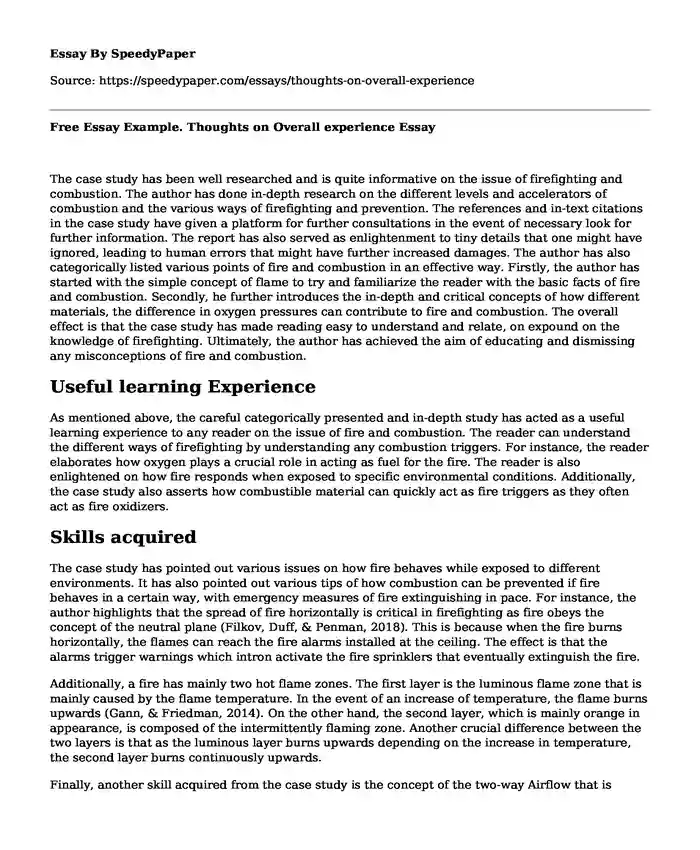
| Type of paper: | Essay |
| Categories: | Knowledge Security Personal experience Behavior |
| Pages: | 3 |
| Wordcount: | 712 words |
The case study has been well researched and is quite informative on the issue of firefighting and combustion. The author has done in-depth research on the different levels and accelerators of combustion and the various ways of firefighting and prevention. The references and in-text citations in the case study have given a platform for further consultations in the event of necessary look for further information. The report has also served as enlightenment to tiny details that one might have ignored, leading to human errors that might have further increased damages. The author has also categorically listed various points of fire and combustion in an effective way. Firstly, the author has started with the simple concept of flame to try and familiarize the reader with the basic facts of fire and combustion. Secondly, he further introduces the in-depth and critical concepts of how different materials, the difference in oxygen pressures can contribute to fire and combustion. The overall effect is that the case study has made reading easy to understand and relate, on expound on the knowledge of firefighting. Ultimately, the author has achieved the aim of educating and dismissing any misconceptions of fire and combustion.
Useful learning Experience
As mentioned above, the careful categorically presented and in-depth study has acted as a useful learning experience to any reader on the issue of fire and combustion. The reader can understand the different ways of firefighting by understanding any combustion triggers. For instance, the reader elaborates how oxygen plays a crucial role in acting as fuel for the fire. The reader is also enlightened on how fire responds when exposed to specific environmental conditions. Additionally, the case study also asserts how combustible material can quickly act as fire triggers as they often act as fire oxidizers.
Skills acquired
The case study has pointed out various issues on how fire behaves while exposed to different environments. It has also pointed out various tips of how combustion can be prevented if fire behaves in a certain way, with emergency measures of fire extinguishing in pace. For instance, the author highlights that the spread of fire horizontally is critical in firefighting as fire obeys the concept of the neutral plane (Filkov, Duff, & Penman, 2018). This is because when the fire burns horizontally, the flames can reach the fire alarms installed at the ceiling. The effect is that the alarms trigger warnings which intron activate the fire sprinklers that eventually extinguish the fire.
Additionally, a fire has mainly two hot flame zones. The first layer is the luminous flame zone that is mainly caused by the flame temperature. In the event of an increase of temperature, the flame burns upwards (Gann, & Friedman, 2014). On the other hand, the second layer, which is mainly orange in appearance, is composed of the intermittently flaming zone. Another crucial difference between the two layers is that as the luminous layer burns upwards depending on the increase in temperature, the second layer burns continuously upwards.
Finally, another skill acquired from the case study is the concept of the two-way Airflow that is critical to the knowledge of every fire-fighter. The concept is based on the concept of the principle of liquids flow. This concept is applicable in combustion in that, the air in the upper portions of a burning fire is higher because of the density variation, thus increasing the temperature. Any external air from outside the room immediately occupies the upper side layer, from the lower side. The upper side usually is dense compared to the lower side. The concept of liquid behaviour, according to Turner et al. (2018) illustrates how the flame can change from one state to the other in a lit room due to the difference in density in the lower and upper layers.
References
Filkov, A. I., Duff, T. J., & Penman, T. D. (2018, September). Extreme fire behaviours: Surveying fire management staff to determine behaviour frequencies and importance. In Bushfire and Natural Hazards CRC & AFAC conference (pp. 5-8).
Gann, R., & Friedman, R. (2014). Principles of fire behavior and combustion. Jones & Bartlett Publishers. ISBN-10: 0-7637-5717-9
Turner, P. J., Siddall, A. G., Stevenson, R. D., Standage, M., & Bilzon, J. L. (2018). Lifestyle behaviours and perceived well-being in different fire service roles. Occupational medicine, 68(8), 537-543. doi: 10.1093/occmed/kqy110.
Cite this page
Free Essay Example. Thoughts on Overall experience. (2023, Mar 27). Retrieved from https://speedypaper.net/essays/thoughts-on-overall-experience
Request Removal
If you are the original author of this essay and no longer wish to have it published on the SpeedyPaper website, please click below to request its removal:
- Education Essay Sample: Operant Conditioning Is the Best Learning Method for Children
- Free Essay with Questions for the Interview with Saudi Professor who Studies English
- Essay Example: Native Speaker Book's Review
- Report Planning for Walmart Company, Free Paper Sample for Students
- Free Essay: The Experiences of Female Students With Sexual Abuse in School
- The Vietnam War Implications. Free Essay Example
- Essay Sample on Unique Health Identifier
Popular categories




